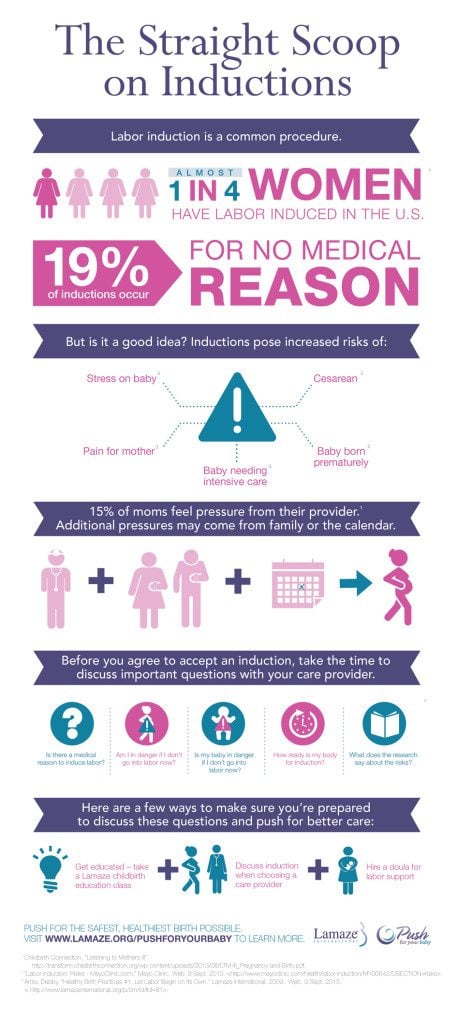A common decision that many parents face today during pregnancy is whether or not they should be induced. An induction happens when a pregnant woman’s labor is artificially started, usually with the synthetic form of oxytocin, Pitocin. Sometimes an induction is medically necessary, which we encourage you to move forward and schedule an induction! You rock it, mama! But there are other times when parents choose an induction out of convenience and not for good health reasons.
Parents should be aware that it’s not always a good idea to be induced when it’s not medically necessary. They need to know why it is important to avoid an induction if your baby and your body are not ready and why it is important to allow labor to begin naturally and without any interference.
Why would I need an induction?
Your healthcare provider might recommend inducing labor for various reasons. For example:
- You’re approaching two weeks beyond your due date, and labor hasn’t started naturally.
- Your water has broken, but you’re not having contractions.
- There’s an infection in your uterus.
- Your baby has stopped growing at the expected pace.
- There’s not enough amniotic fluid surrounding the baby (oligohydramnios).
- Your placenta is calcifying (they may say “getting tired”).
- The placenta peels away from the uterus’s inner wall before delivery — either partially or completely (placental abruption).
- You have a medical condition that might put you or your baby at risk, such as high blood pressure or diabetes.

Can I wait for labor to begin naturally?
You usually have up to two weeks after your due date, and in some cases, only one week before you are scheduled to be induced (read 12 ways to induce labor naturally HERE). Why the concern after two weeks? The longer your pregnancy continues, the larger your baby is likely to be — which medical staff is afraid might complicate a vaginal delivery. In other cases, aging of the placenta might compromise a baby’s ability to thrive in the womb. An overdue baby is also more likely to inhale fecal waste (meconium) during childbirth, which can cause breathing problems or a lung infection after birth. These are the concerns.
What are the risks?
Here are the risks and reasons why you would want to avoid labor induction in childbirth:
1. You could be at risk of delivering a premature baby.
Studies are showing that babies who are even slightly premature have more problems at birth and beyond. There are no proven health benefits for forcing your baby from the womb before your baby has had enough time to develop properly. In the last few days before the birth of your baby, the final layers of fat are placed, and the lungs are receiving the finishing touches even as you are going through labor. All of this will help your baby to be comfortable in a change of environment. If you are a first-time mother, your baby will most likely be ready to be born eight days after your estimated due date.
2. Your baby may experience heart decelerations.
The medications used to induce labor — oxytocin or prostaglandin — might provoke too many contractions too close together and too strong of contractions. All of this can diminish your baby’s oxygen supply and lower your baby’s heart rate. This causes more interventions to be performed, which then increases your chances of a cesarean section.
3. You may get an infection.
Some labor induction methods, such as stripping or sweeping the membranes, breaking water, or placing a balloon catheter (also known as a Foley catheter) or seaweed rods into the cervix, might increase the risk of infection for both you and baby.
4. Your labor may become more painful and prolonged.
Your contractions may become too long, too strong, and too close together, causing you to be more uncomfortable, tired and potentially putting your baby in distress. Yes, the medical staff can turn your Pitocin off and/or lower the dosage, but this doesn’t always feel to the mother like her contractions’ intensity has lessened.
5. You may not be ready physiologically or emotionally to give birth.
Understanding that hormones will release from the baby, which actively starts labor, puts “waiting until the baby is ready” in a better perspective. This will, in most cases, signal the body to begin preparing at the appropriate time. And the body also will receive feedback through this hormone signaling process to begin secreting opiates to aid the body in handling the stresses it will undergo. Inducing labor could cause unnecessary stress on your body and your baby. Additionally, it prevents your body from responding and coping appropriately.
6. Your baby may experience harm caused by mechanical force.
The force of the artificial contractions could potentially damage your baby’s brain and affect your baby’s ability to breathe. Babies that find themselves on respirators inside the Neonatal Intensive Care Unit (NICU) are often the result of interventions.
7. You may be at risk of secondary infertility.
Infertility is a risk due to the increased risk of damage to your uterus caused by uterine rupture.
8. You may be at risk of bleeding throughout your labor and after childbirth.
This happens because of the damage caused to your uterus by the induction drugs creating a greater difficulty in caring for the new baby and the increased possibility of prolonged postnatal depression caused by the induction drugs. It’s common to have bloody show during labor and lochia after childbirth, but inductions cause women to bleed more.
9. You may not be able to avoid pain-relieving medication (like an epidural) due to the abnormally increased pain during labor.
Few women can have an induced birth without additional drugs to handle the increased pain from artificial contractions. However, some women do! I have personally helped several women achieve this as their birth doula, but it is still incredibly challenging.
10. You could unknowingly trigger a cascade of medical interventions.
You may have begun your induction with Cervidil to help ripen your cervix and then went to Pitocin or Cytotec to help dilate. Because of the strong medications to force your cervix to thin and open, multiple narcotic drugs for relieving increased pain are common. This means that you may choose an analgesic drug (Nubain, Demerol, Stadol, etc.) or an anesthetic (epidural or spinal block), which an epidural is the most common. Then you will need a bladder catheter, continuous fetal monitoring, checking your blood pressure every 15 to 30 minutes, potentially an assisted vaginal birth (meaning forceps or the use of a vacuum extractor or even an episiotomy). That’s a lot for your body to go through!
11. You could have a uterine rupture.
This is a rare but serious complication in which the baby breaks through the uterus wall into the mother’s abdomen. Cases like this occur in women who have a scarred uterus. (This means if you’ve had a previous C-section, you cannot be induced because that increases your chances of uterine rupture.) An emergency C-section is needed to prevent life-threatening complications if this happens.
Why you DON’T want to schedule an induction.
If you don’t induce your labor and allow your labor to begin normally, your:
- Contractions may be less painful than they would be with Pitocin.
- Labor may be shorter and more productive. (Your body will be ready for it).
- Baby may be able to breathe better.
- Health costs associated with your birth may reduce.
- The need for pain medication may be less, which helps save you money.
- Delivery may be shorter.
- Recovery may be faster.
- You and your baby may be healthier as a result.
- Baby may breastfeed more easily.
- The ability to bond and attach to your new baby may be easier.
Inducing labor is a serious decision. Again, if it’s medically necessary, do it! But if you’re just tired of being pregnant, or you want your baby born on a specific date, or because your family or doctor will be in town, it might not be worth it in the long run. Work with your healthcare provider to make the best choice for you and your baby. But I will say, avoiding a labor induction is one of the best secrets to having safe and gentle labor and delivery for both mother and baby.































